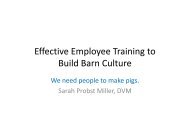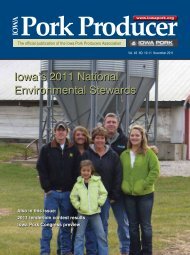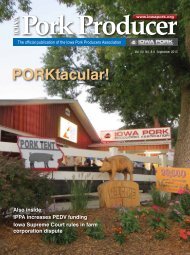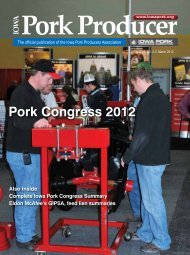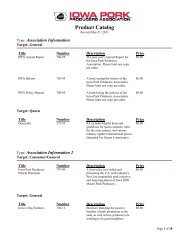September 2011 - Iowa Pork Producers Association
September 2011 - Iowa Pork Producers Association
September 2011 - Iowa Pork Producers Association
You also want an ePaper? Increase the reach of your titles
YUMPU automatically turns print PDFs into web optimized ePapers that Google loves.
Journey time also affected the<br />
pig’s ability to handle the stress of<br />
loading and unloading, Ellis said.<br />
“There’s not much research<br />
on this topic as it pertains to<br />
transportation loss,” he added.<br />
“But we have evidence that<br />
suggests short journey times<br />
could actually lead to higher<br />
incidences of losses because the<br />
pigs need a minimum amount of<br />
time to recover from the stress of<br />
loading at the farm. Normally, a<br />
pig will recover if given enough<br />
time. On short journeys, you<br />
may superimpose the stress of<br />
unloading onto animals who<br />
haven’t yet recovered from the<br />
stress of loading.”<br />
Although previous recommendations<br />
from Ellis and his team of<br />
researchers regarding floor<br />
allocation space have resulted in<br />
lower transportation losses (less<br />
than half of a percent of pigs in<br />
most well-managed systems), it<br />
remains a concern because the<br />
producer has invested a great<br />
amount of money to get pigs to<br />
that stage.<br />
Co-author Bradley Wolter, chief<br />
operating officer of The Maschhoffs<br />
in Carlyle, Ill., said working with<br />
the Ellis lab has allowed their<br />
company to lower pig losses within<br />
the supply chain between The<br />
Maschhoffs and its customers by<br />
more than one percentage unit.<br />
Because the industry has made<br />
such great strides to improve<br />
transportation and animal handling,<br />
this study did not show the trends<br />
and differences Ellis expected to see.<br />
“We did visual assessments of how<br />
stressed the pigs were upon arrival<br />
at the plant,” he said. “They were<br />
definitely more stressed after being<br />
unloaded from shorter journeys.<br />
But, anytime the losses are low to<br />
start with, you won’t find many<br />
factors that will lower them further.<br />
As losses are reduced, it’s more<br />
difficult to show how these factors<br />
are involved.”<br />
This is a good problem — and a win<br />
for everyone involved, Ellis said.<br />
SEPTEMBER <strong>2011</strong><br />
21





